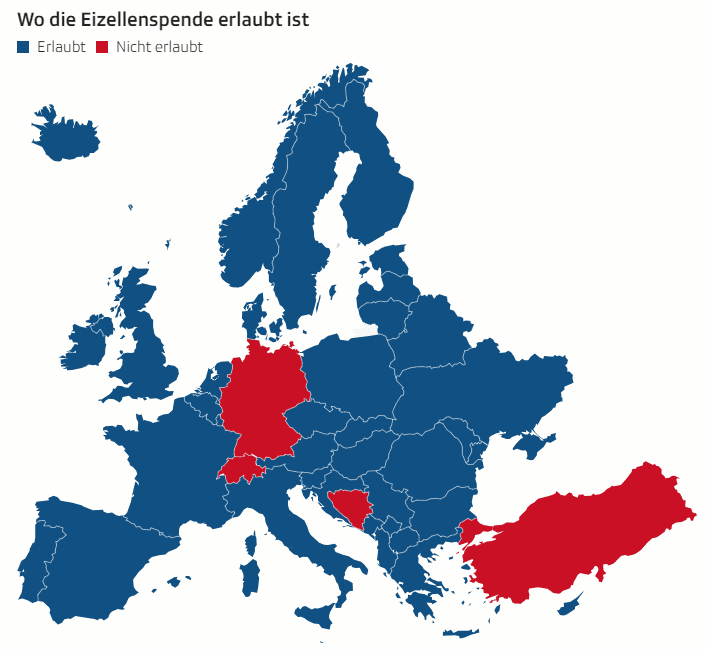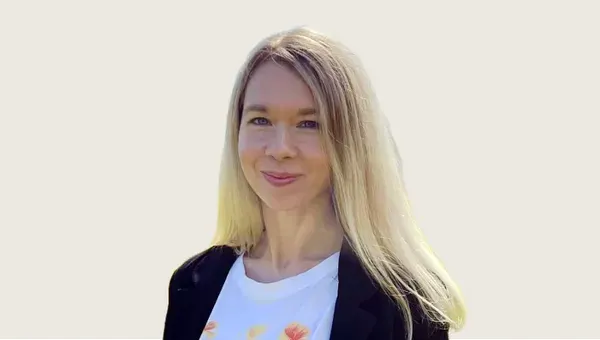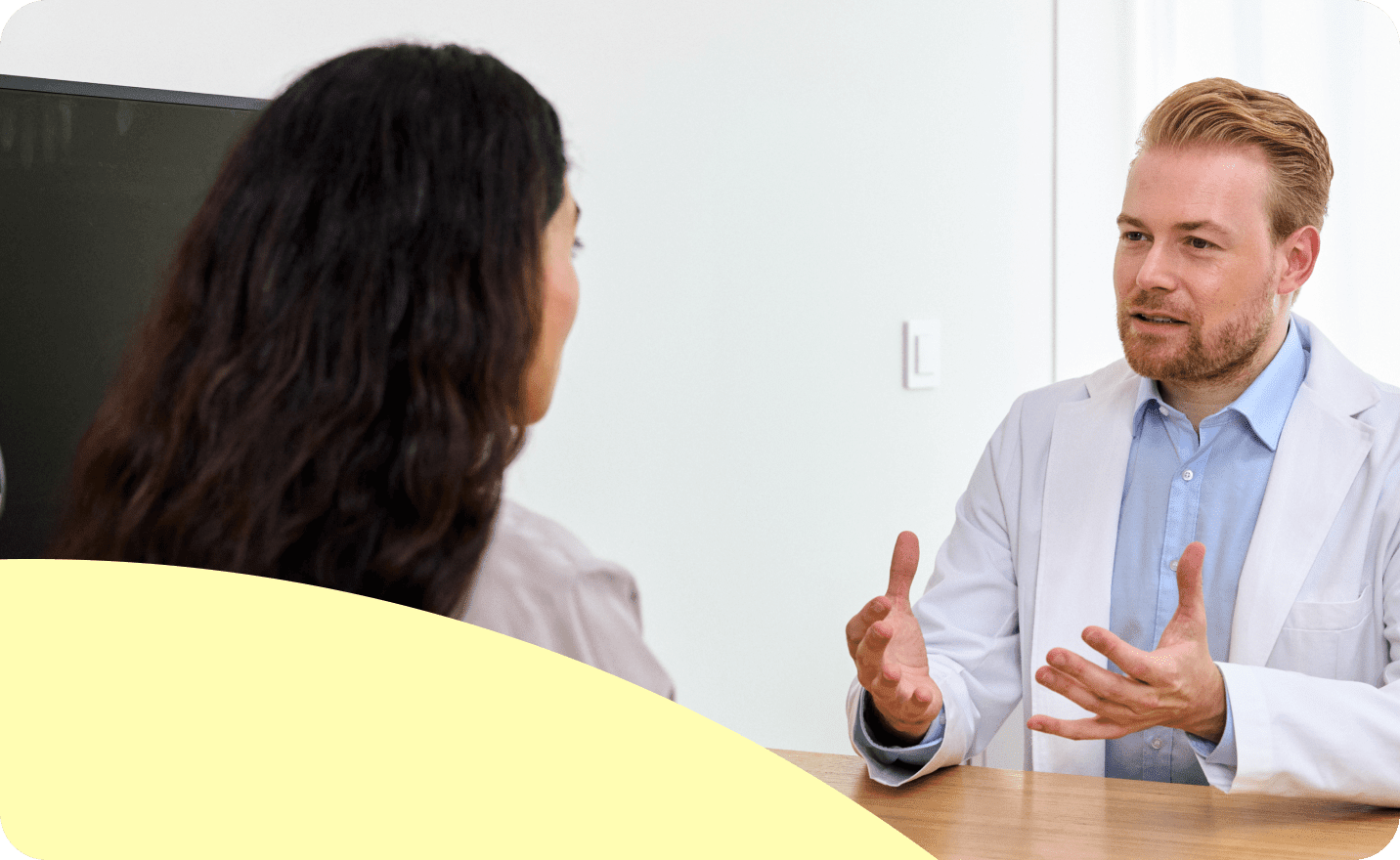Explore the current legal landscape of egg donation in Switzerland and discover alternative paths to parenthood.
Key Facts:
- Egg donation is currently prohibited in Switzerland, while sperm donation is permitted.
- Most European countries allow egg donation, but it's also prohibited in Germany.
- A legal framework for egg donation is being developed, with anonymous donations to be excluded.
- IVF with egg donation abroad costs between CHF 8,000 and CHF 12,000 per cycle.
- Alternatives to egg donation include social egg freezing, surrogacy (also prohibited in Switzerland) and adoption.
Introduction
Egg donation offers hope to infertile couples and individuals, enabling them to fulfill their dream of starting a family.
In Switzerland, egg donation is currently prohibited, while the donation of sperm cells has been permitted under certain conditions since 2001. This unequal treatment has sparked an ongoing debate about legalising egg donation. Proponents argue that it helps couples with infertility to have children and levels the playing field for infertile women. Opponents, however, express concerns about potential ethical and social implications.
What is egg donation?
Egg donation is a fertility treatment where a woman (the egg donor) provides one of her eggs to another woman or couple (the recipient) who cannot produce viable eggs or conceive using their own. The donated egg is fertilised with sperm from the intended father or a donor and then implanted into the recipient's uterus as a blastocyst after about five days.
Legal status of egg donation in Switzerland
Egg cell donation is currently prohibited in Switzerland.
This ban is codified in the Federal Act on Medically Assisted Reproduction (Reproductive Medicine Act, FMedG), enacted in 2001. Article 4 of this act stipulates that a woman's eggs may only be fertilised for her own use, explicitly forbidding egg donation. Both the donor and the recipient would be subject to prosecution under this law.
Arguments against egg donation
- Exploitation of women: Critics worry that legalising egg donation could lead to the exploitation of women who might donate eggs for financial gain. While some countries, like Austria, prohibit financial compensation for donors, others, such as Belgium, allow payments of around CHF 2,000 for donated eggs.
- Child's right to know their origins: Another concern is the child's right to know their biological parentage. Children should have the opportunity to learn about their genetic origins. Donor anonymity could potentially cause identity issues and psychological stress for the child.
- Physical and hormonal stress: Unlike sperm donation, egg donation requires women to undergo hormonal stimulation to produce multiple mature eggs. This process is followed by egg retrieval under anesthesia. Both the hormonal treatment and the procedure can be physically taxing. While long-term studies are limited, some research suggests possible health risks, including impaired fertility, increased cancer risk (particularly ovarian cancer), and psychological stress.
- Bonding concerns: Some argue that a mother may struggle to bond with a child who is not genetically related to her. However, studies have disproven this notion, showing that children conceived through egg donation demonstrate equivalent development and mental health compared to control groups.
Arguments in favor of egg donation
- Consistency with sperm donation: The ban on egg donation contrasts with other permitted forms of reproductive medicine in Switzerland, particularly sperm donation. This discrepancy has sparked discussions about potential gender inequality.
- Right to parenthood: The Swiss constitution guarantees all individuals the right to fulfill their desire for children. Proponents argue that this right shouldn't be restricted when medical assistance, such as egg donation, is necessary. They contend that couples and singles should have the right to use both donor sperm and egg donation to achieve their dream of having children.
- Reduce reproductive tourism: The ban on egg donation compels those affected to seek treatment abroad, where medical care and legal frameworks may not meet Swiss standards. This can pose health risks for both donors and recipients.
- Increase social acceptance: Egg donation is practiced in many countries and is gaining societal acceptance. Legalising it in Switzerland would help destigmatise the procedure and foster greater understanding and acceptance.
When will egg donation be legalised in Switzerland?
The exact timeline for legalising egg donation in Switzerland remains uncertain. It's likely to take several years before actual legalisation occurs. Currently, we only know that a legal framework for egg donation is being developed.
In 2021, the Committee for Science, Education and Culture proposed a motion to legalise egg donation for married couples. The National Council approved this motion in March 2022, followed shortly by the Council of States. However, the Federal Council rejected it, citing the need to revise the Reproductive Medicine Act. A legislative mandate for regulated egg donation in Switzerland has been issued, which excludes anonymous donations.
Why can't surplus eggs be donated?
What happens to frozen gametes—such as those from social freezing—that are no longer needed or are destroyed after 10 years? Could these be donated to individuals or couples wanting children? Four scientists from the University of Zurich are investigating these questions.
For more information on this topic, listen to this podcast (in German):
When is egg donation an option?
For couples struggling to conceive, the cause often lies with the woman. In such cases, egg donation can be an option to fulfill the desire for a biological child. This treatment is particularly suitable for women who:
- Have become infertile due to medical treatments like chemotherapy
- Experienced early menopause (before age 40)
- Wish to have a child after menopause
- Suffer from genetic diseases (e.g., Turner syndrome or translocations)
- Have gynaecological abnormalities (e.g., born without ovaries)
- Have severe endometriosis
- Have had several unsuccessful attempts at artificial insemination with their own eggs
- Have experienced repeated miscarriages

How does egg donation work?
1) Selection of the donor
The selection process varies depending on whether the donation is anonymous or not.
- Anonymous donation: Intended parents typically select a donor from a database. The clinic ensures basic characteristics match, such as physical similarities to the intended mother and blood type ('matching').
- Open donation: Intended parents receive a detailed donor profile from the clinic, including information on appearance, personality, interests, and medical history.
Regardless of the donation type, all donors undergo thorough examinations:
- Genetic testing: To ensure no hereditary diseases can be passed on to the child
- Infectious disease screening: Tests for diseases such as HIV and hepatitis
- Psychological evaluation: To assess the donor's mental health and motivation for donating
2) Preparation of the donor
First, the cycles of the donor and recipient are synchronized, typically using hormonal contraceptives. The donor then undergoes hormone treatment to stimulate the maturation of multiple eggs in her ovaries, a process that takes about 10-12 days.
3) Preparation of the recipient
The recipient receives hormone treatment to prepare her uterine lining for embryo implantation, ensuring the endometrium is receptive.
4) Egg retrieval
Mature eggs are retrieved from the donor under light anesthesia in a brief procedure.
5) Fertilisation
The retrieved eggs are fertilised in the laboratory using in vitro fertilisation (IVF) with sperm from either the recipient's partner or a donor. If using the recipient's partner's sperm, it must be frozen beforehand.
6) Embryo transfer
One or more resulting embryos are transferred into the recipient's uterus. Any remaining viable embryos can be frozen for future attempts.
7) Pregnancy test
A pregnancy test is conducted approximately two weeks after the embryo transfer.
What alternatives are there to egg donation?
If egg donation isn't possible or desired, alternatives include social egg freezing, surrogacy or adoption.
Social egg freezing allows women to preserve their fertility for the future, provided their egg quality is sufficient. However, for optimal results, eggs should be frozen before age 35.
Surrogacy with donated eggs is another option, though in Europe, it's currently only permitted in Greece and Ukraine.
Adoption is also an alternative, where a non-biological child becomes part of the family. This option is available to singles and unmarried couples as well.
Our recommendation for you
Many couples in Switzerland and Germany face similar challenges. The following documentary (in German) provides comprehensive information about egg donation and the hurdles couples encounter when seeking treatment abroad to fulfill their desire for a child:
Frequently asked questions
Where is egg donation currently permitted in Europe?
An estimated 500 Swiss women travel abroad annually for egg donation procedures. Spain and the Czech Republic, which allow anonymous donation, are popular destinations. Other countries like England and Finland offer non-anonymous donation.
As in Switzerland, egg donation is also prohibited in Germany.
However, most European countries permit egg donation, at least for heterosexual couples.

What is the success rate of egg donation?
Each phase of egg donation has its own success rates:
- Fertilisation and embryo development: A meta-analysis of IVF with egg donation found a fertilisation rate of about 80%. Around 40% of embryos developed to the blastocyst stage.
- Implantation: The implantation rate per embryo transfer after egg donation is about 30%, similar to IVF or ICSI.
- Clinical pregnancy: Rates vary by age. For women under 40, it's around 42%; for those over 40, about 22%.
How long does egg donation take?
The process typically takes 4-6 weeks from donor selection to embryo transfer.
How much does egg donation cost?
IVF treatment with egg donation costs between CHF 8,000 and CHF 12,000, including medication, depending on the country and fertility clinic. Additional cycles, if needed, cost CHF 4,000 to CHF 6,000 using the resulting embryos.
Takeaway
The egg donation debate in Switzerland is complex and emotionally charged. Supporters emphasize reproductive freedom and the right to have children, while opponents raise concerns about potential ethical and social implications.
The forthcoming revision of the Reproductive Medicine Act will reveal how Switzerland addresses this challenge and whether it can regulate egg donation in a way that balances the needs of couples wanting children with ethical considerations.
Many other European countries have shown that regulated egg donation is feasible and can help couples fulfill their dream of having a child.







